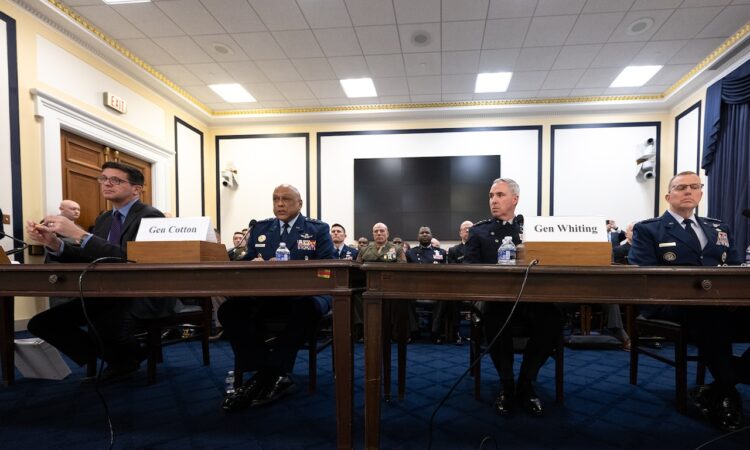To Meet Security Challenges, DOD Makes Investments in Strategic Forces > U.S. Department of Defense > Defense Department News

The Defense Department is making investments in strategic force capabilities in the fiscal 2025 budget in order to meet the security challenges posed by competitors, such as nuclear-capable China and Russia, as well as Iran and North Korea, a DOD official said.
John Plumb, the assistant secretary of defense for space policy, on Thursday, told lawmakers at the House Armed Services Committee that the FY 2025 budget request includes investments to modernize the nuclear triad. This includes land, air and sea-based nuclear capabilities and investments to ensure continued access to space and defense against missile threats.
“We have competitors who are modernizing and diversifying and expanding their nuclear arsenals,” Plumb said. “They are also rapidly fielding space and counter-space capabilities and developing and fielding advanced missiles in … greater numbers and greater diversity.”
Plumb told lawmakers that DOD, within the president’s budget request, has asked for $49.2 billion to modernize the department’s nuclear triad. Included in the request are investments for the Columbia-class ballistic missile submarine, the B-21 bomber and the Sentinel system, which is a modernization for the ground-based portion of the nuclear triad.
Also in the FY 2025 budget request, Plumb said, is $33.7 billion for space capabilities and $28.4 billion for missile defeat and defense.
“Across each of these portfolios, we’re investing not only in capabilities but in our network of allies and partners, both of whom provide advantages that our adversaries or potential adversaries, like Russia and China, can never hope to match,” Plumb said. “All of these capabilities — nuclear, space and missile defense — remain central to our ability to deter and also central to our ability to prevail in conflict if deterrence fails.”
Air Force Gen. Anthony Cotton, commander of U.S. Strategic Command, also reminded lawmakers that the U.S. is confronted by two nuclear peers: China and Russia, and that threat is compounded by missile developments in North Korea and the nuclear ambitions of Iran. With this threat, he said, it’s imperative that the U.S. press on with modernization of the nuclear triad.
“It is absolutely critical we continue at speed with modernization of our nuclear triad,” he said. “This includes the land-based [intercontinental ballistic missiles], the B-21, the B-52J, the Columbia-class submarine, the nuclear sea-launched cruise missile, the long-range standoff weapon and numerous related systems.”
Also a focus, he said, is updating and modernizing the antiquated nuclear command, control and communications system, also called NC3.
“The most important message I want to deliver is this: While modernization will continue to be the priority, U.S. Stratcom and its component forces are ready to deter our adversaries and respond decisively should deterrence fail,” Cotton told lawmakers.
Space Force Gen. Stephen N. Whiting, commander of U.S. Space Command, said the command has a moral responsibility to ensure space capabilities remain available to the joint force, the nation and allies.
“The U.S. military services are sized with the assumption of always having access to space,” Whiting said. “And this is why U.S. Space Command must protect and defend our critical space systems to ensure they are available in the face of the growing threats now arrayed against us.”
Part of that responsibility, Whiting said, involves expanding the existing U.S. competitive advantage by leveraging assets of the interagency, the joint force and U.S. allies and partners. Also an asset, he said, is the U.S. space industry.
“I think one of our nation’s principal advantages is our commercial space industry,” he said. “It is moving at incredible speed with innovation, and it is outpacing commercial industry from the rest of the world. And so today, we partner with those companies in a number of ways.”
In testimony given earlier this year, Whiting discussed Space Command’s Commercial Integration Center, for instance, where the command partners with 10 commercial mission partners to improve on the ability to defend satellite constellations.
The joint commercial operations effort also includes eight commercial mission partners across the globe to provide space domain awareness information to the joint force, allies and partner nations
“We’re always looking at how we can better both share information and leverage the capabilities that commercial [companies] brings us because we believe that makes us more effective,” Whiting said.
Air Force Gen. Gregory M. Guillot took over as commander of United States Northern Command and North American Aerospace Defense Command in February. He told lawmakers that, upon assuming the role, he directed a 90-day assessment of both organizations to execute their missions and to also make recommendations on where the commands can do more.
“Once complete, I will share my findings and updated vision for how NORAD and Northcom will best execute the noble mission of homeland defense,” Guillot said. “The challenges facing our nation are real, but there should be no doubt about NORAD and Northcom’s resolve to deter aggression and if necessary, defeat threats to our nation and our citizens.”






